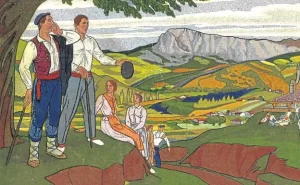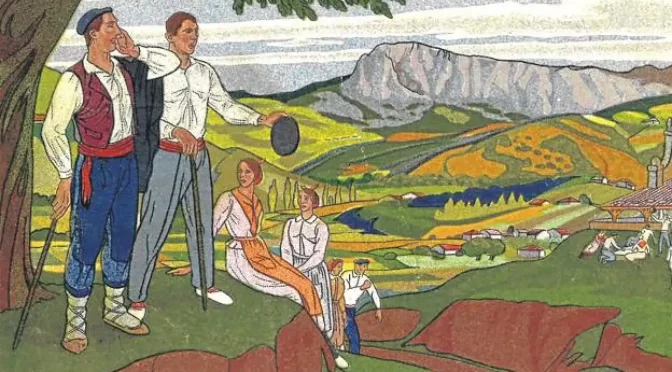In an atmosphere full of wonderful sites and sounds, perhaps one of the more unusual sounds heard at Basque festivals is the high-pitched wavering cry known as the Irrintzi. In the mountains and valleys of the Basque Country, the Irrintzi can echo for countless miles, so originally it was a means of communication. Today, it is associated with joy and celebration.

- The irrintzi is thought to originate amongst Basque shepherds. The high-pitched cry would reverberate from the mountainsides and thus travel long distances. It was used as a way to communicate across valleys. It was also used in battles. There are accounts from the Middle Ages in which Basques used the irrintzi to intimidate their enemies, particularly Muslim invaders. A particularly bad Hollywood scene in which Basques use the irrintzi to communicate during battle appeared in the movie Thunder in the Sun.
- Today, the irrintzi is a cry of celebration and is often heard at fiestas, where there are often competitions for the best irrintzi. It can reach 120 decibels – the same as a chainsaw or a rock concert.
- Irrintzi also means neigh, suggesting that originally it was mimicking the neigh of a horse. However, there are other names for the cry – zantzo or lekaixu – meaning that there could be another origin.
- The irrintzi saw the limelight when, in 1918, a cry was let loose from Victor Hugo Street in Baiona to celebrate the armistice of the First World War.
- According to Augustin Chaho, a Basque linguist and author in the first half of the 1800s, the irrintzi is but one of many types of cries used by the Basques. The others include:
- Khereillu: shouting.
- Karraxia: confused cry.
- Oihu: cry of calling out.
- Deigrito: cry to wake up.
- Hela: cry of warning.
- Auhendu: cry of lamentation.
- Orroko: scream of horror.
- Marraka: cry of pain.
- Marraska: tearful cry.
- Marruma: muffled cry.
- Heiagora: cry of affliction.
- Deihadarra: cry of alarm.
- Uhuri: howling scream.
- Marrobia: roaring cry.
- Sinkha: shout of jubilation.
- Irrintzina: cry of laughter.
- Kikisai: shout of joy.
- Hozengu: shout of acclamation.
- Dundura: a collective shout.
- The irrintzi is one type of ululation, or high-pitched trilling howl. Such cries are common throughout the world, including the Middle East, Africa, and Asia.
- As an example of an irrintzi, here is a video of Vanessa Sanchez’s irrintzi as she performed it in a lab to understand the muscles and posture involved.
A full list of all of Buber’s Basque Facts of the Week can be found in the Archive.
Primary sources: IRRINTZI. Enciclopedia Auñamendi [en línea], 2024. Available at: https://aunamendi.eusko-ikaskuntza.eus/es/irrintzi/ar-76986/; Irrintzi (grito), Wikipedia
Discover more from Buber's Basque Page
Subscribe to get the latest posts sent to your email.


